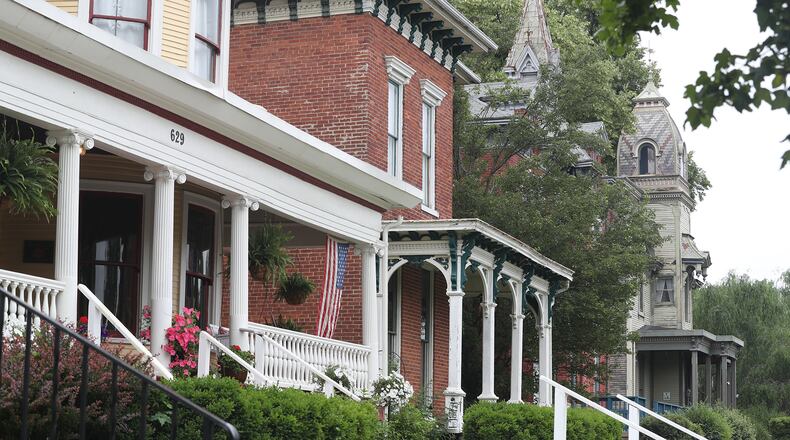The report listed examples as well as strategies that can work in these cities which are referred to as legacy cities because they were once industrial and manufacturing hubs. Some of the cities featured in the report have engaged in programs that not only aid long-term economic growth but can also promote racial equity as well as reduce harm to those of lower socio-economic status.
Springfield was featured due to an approach taken by the city known as compassionate code enforcement that aims to work with residents in making repairs to their home and complying with those rules.
Another local initiative highlighted in the report is the Greater Springfield Partnership-led Candidates College that aims to educate residents in becoming civic leaders.
The idea is to showcase examples gathered from surveys conducted across the country as a reference to other cities as they engage in economic development work. The goal is to encourage economic development while aiming to reduce racial and economic disparities instead of pursuing strategies that may ignore those issues or make them worse.
Thinking about equity
The report was conducted by the Greater Ohio Policy Center and the Lincoln Institute of Land Policy and is titled “Equitably Developing America’s Smaller Legacy Cities: Investing in Residents from South Bend to Worcester.”
It aims to highlight strategies that can be implemented in local plans for economic development, but also offers case studies showing some examples in practice.
Smaller legacy cities are usually defined as primarily midwestern and northeastern cities with 30,000 to 200,000 residents that have economies built around manufacturing.
The idea is that by looking at smaller legacy cities it can provide examples and strategies for similar areas as what might have worked for larger cities may not be applicable.
“We are thinking about equity in terms that address persistent racial and income segregation. We are also looking at strategies that can work to address those issues,” said Erica Spaid Patras, the senior manager of special projects for the Greater Ohio Policy Center.
“We want to make opportunity accessible to all that includes improvements for those of lower income and communities of color,” Spaid Patras added.
The focus on racial and economic disparities in those communities was further examined as the coronavirus pandemic highlighted those realities as well as social justice protests that emerged last year that focused on racial inequality.
Spaid Patras said her organization wanted to participate in the report because the legacy of racial and economic segregation in traditional legacy cities constitutes a drain on economic prosperity and opportunities as a whole in those areas.
The report does not serve as a comprehensive study on eradicating racism and injustice from smaller legacy cities but instead looks at ways to incorporate equity into revitalization strategies.
The report uses the term equity to broadly refer to an overarching goal that makes economic opportunities accessible to all regardless of background and circumstance, “with a focus on improving outcomes for low-income populations and communities of color to bring them into parity with other populations.”
Strategies outlined in the report fall into two categories that include those that build an ecosystem to foster equitable development and those that directly reduce disparities and increase civic capacity.
The first category acknowledges the importance of relationships and trust in sustaining meaningful, equitable development work, according to the report.
The second describes strategies that can reduce disparities in life outcomes for residents and improve economic prospects for the city as a whole, the report added.
The report looked at ways that some smaller legacy cities are building trust and repairing strained relationships in their community, building a layered and diverse coalition of community-based groups and conducting strategic planning and visioning.
It also looked at ways some smaller legacy cities have and could adopt strategies such as utilizing place-based investments, cultivating homegrown talent, anticipating neighborhood change and planning for stability as well as recalibrating existing operations to better yield equity.
What has worked in Springfield
With a focus on development that can help address equity, the report showcased a program by the City of Springfield that was established as the city was looking to improve housing conditions in some southside neighborhoods.
City staff were directed to uphold property maintenance standards. However, traditionally that course of action usually resorts in punitive actions such as citations and fines.
“While more stringent code enforcement was needed to motivate inattentive landlords, the city worried that increased enforcement would burden private homeowners, many of whom were Black, with unaffordable repairs or fines,” the report stated.
As a result, the city established the Housing Supplies Working Group in early 2020 to help low- and moderate-income homeowners fix code violations and avoid financial penalties, the report added.
Jeremy Leist, a code enforcement officer with Springfield, said that one of the best resources they can give to residents is time. That involves talking to property owners and addressing obstacles in getting home up to code.
Those obstacles could include not having resources or money to conduct those repairs or not being physically able to do repairs themselves.
“We are not here to be the bad guys,” Leist said. Instead he says the idea is to engage in conversations about code enforcement that highlight preventative maintenance on homes. That could be repainting homes or repairing exterior damage to homes, including roofs.
In addition to having conversations, compassionate code enforcement also aims to connect those residents with community groups that can provide resources for those repairs. That includes working the Neighborhood Housing Partnership as well as Habitat for Humanity.
Those groups can work with homeowners to address a plan to address the violation or make referrals to other nonprofits to help fix the problem.
One example is the NHP facilitating an agreement between the city and a homeowner in which the latter could buy paint one paycheck at a time and to slowly repaint their house.
Leist said that the program is being rolled out gradually and is currently focused on neighborhoods that align with the city’s engage neighborhood plan. So far the program has focused on some neighborhoods south west of the downtown area.
Another case study that highlighted Springfield are efforts to cultivate homegrown talent through programs that create pathways to leadership for more people.
“These programs feed the city’s leadership pipeline and elevate voices not historically heard at the decision making table,” the report said referring to programs in Springfield and Fitchburg, Massachusetts, which address those goals in different ways.
In Springfield, a program was implemented by the Greater Springfield Partnership, then known as the Chamber of Greater Springfield, in 2016. The idea is to curate guest speakers who train prospective elected officials on the principles of good government and election procedures.
The idea is to host an annual program called the Candidates College for those considering a run for local office. It consists of three sessions that are each two hours long and features meetings with civic leaders in order to learn how to run a campaign, the report stated.
“The nonpartisan chamber does not endorse or support candidates running for office, but it strives to increase the number of qualified candidates committed to advancing the city and region through the principles of good government,” the report added.
Further conversations
With the report being released in May, a webinar will be held on Tuesday that will further discuss why equitable development is a sound strategy for smaller legacy cities today.
The webinar is hosted by the Lincoln Institute of Land Policy and is titled “Rebuilding with Equity: The Future of Smaller Legacy Cities.”
Those invited to speak will share stories from legacy cities that are already embracing equity and inclusion. One of the speakers is Springfield native Dorian Hunter who grew up on the south side and aims to aid efforts to build up the part of town that has historically seen disinvestment and lack of resources.
Hunter is a is a cofounder of multiple organizations operating in Springfield including DreamVision, Springfield’s NAACP Youth Committee, and The Unified Collective.
Hunter said that he wants to highlight work centered around equity that has taken place in the south side.
He will join Lark Mallory, who is the general counsel and director of CDFI Investments for The Affordable Housing Trust for Columbus and Franklin County, as well as Robert Simpson, the president of the CenterState Corporation for Economic Opportunity, who does work in the Syracuse region in New York.
The hour long webinar will start at 1 p.m., Tuesday and those interested in registering for the invent can visit lincolninst.edu.
Webinar
Rebuilding with Equity: The Future of Smaller Legacy Cities
When: 1 p.m. Tuesday
Where: lincolninst.edu
Who: Springfield native Dorian Hunter and representatives from other former industrial and manufacturing cities
About the Author

